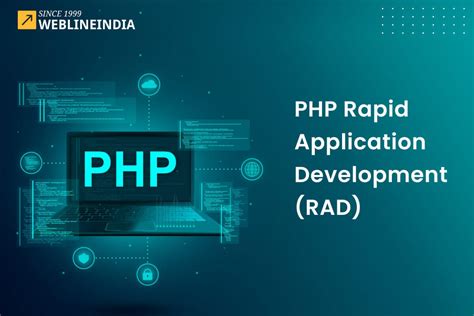Rapid application development (RAD) is a software development methodology that emphasizes rapid prototyping and continuous improvement. It's a popular approach among developers, especially those who want to quickly build and deploy applications. In this article, we'll explore the concept of RAD and how PHP can be used to simplify the process for beginners.
What is Rapid Application Development?
RAD is a software development methodology that focuses on rapid prototyping and continuous improvement. It's a iterative approach that involves breaking down the development process into smaller, manageable chunks, and continuously refining the application based on user feedback.
RAD was first introduced in the 1980s by James Martin, who proposed it as a way to speed up the software development process. Since then, it has become a widely accepted approach in the software industry.
Why Use PHP for Rapid Application Development?
PHP is a popular programming language that's well-suited for rapid application development. Here are some reasons why:
- Easy to learn: PHP is a relatively simple language to learn, making it a great choice for beginners.
- Fast development: PHP allows developers to quickly build and deploy applications, thanks to its simple syntax and extensive libraries.
- Large community: PHP has a massive community of developers, which means there are plenty of resources available for learning and troubleshooting.
- Extensive libraries: PHP has a vast collection of libraries and frameworks that make it easy to build complex applications quickly.
Key Principles of Rapid Application Development
Before we dive into the specifics of using PHP for RAD, let's cover some key principles of the approach:
- Iterative development: RAD involves breaking down the development process into smaller, manageable chunks, and continuously refining the application based on user feedback.
- Continuous testing: Testing is an essential part of the RAD process. Developers should test the application regularly to ensure it meets the required standards.
- Rapid prototyping: RAD involves creating rapid prototypes of the application to test and refine the concept.
- User involvement: User feedback is critical in RAD. Developers should involve users in the development process to ensure the application meets their needs.
Using PHP for Rapid Application Development
Now that we've covered the basics of RAD and PHP, let's explore how to use PHP for rapid application development.
PHP Frameworks for RAD
PHP has several frameworks that make it easy to build complex applications quickly. Some popular frameworks include:
- Laravel: Laravel is a popular PHP framework that's well-suited for rapid application development. It offers a robust set of tools and libraries that make it easy to build complex applications quickly.
- CodeIgniter: CodeIgniter is another popular PHP framework that's designed for rapid application development. It's lightweight, flexible, and easy to use.
- Symfony: Symfony is a robust PHP framework that's well-suited for complex applications. It offers a wide range of tools and libraries that make it easy to build scalable applications.
PHP Libraries for RAD
PHP has several libraries that make it easy to build complex applications quickly. Some popular libraries include:
- Twig: Twig is a popular PHP templating engine that makes it easy to separate presentation logic from application logic.
- Doctrine: Doctrine is a popular PHP ORM (Object-Relational Mapping) library that makes it easy to interact with databases.
- Guzzle: Guzzle is a popular PHP HTTP client library that makes it easy to build RESTful APIs.
Rapid Prototyping with PHP
Rapid prototyping is an essential part of the RAD process. PHP makes it easy to build rapid prototypes of applications using its simple syntax and extensive libraries.
Here's an example of how to build a simple RESTful API using PHP and the Guzzle library:
use GuzzleHttp\Client;
$client = new Client();
$api = $client->get('https://api.example.com/users');
$users = json_decode($api->getBody(), true);
foreach ($users as $user) {
echo $user['name']. '
';
}
This code uses the Guzzle library to fetch data from a RESTful API and display it on the screen.
Continuous Testing with PHP
Continuous testing is an essential part of the RAD process. PHP offers several tools and libraries that make it easy to test applications.
Here's an example of how to write a simple unit test using the PHPUnit library:
use PHPUnit\Framework\TestCase;
class UserTest extends TestCase
{
public function testGetName()
{
$user = new User();
$user->setName('John Doe');
$this->assertEquals('John Doe', $user->getName());
}
}
This code uses the PHPUnit library to test the User class and ensure it behaves as expected.
Best Practices for RAD with PHP
Here are some best practices to keep in mind when using PHP for rapid application development:
- Keep it simple: PHP is a simple language, so keep your code simple and concise.
- Use frameworks and libraries: PHP frameworks and libraries make it easy to build complex applications quickly.
- Test regularly: Testing is an essential part of the RAD process. Test your application regularly to ensure it meets the required standards.
- Involve users: User feedback is critical in RAD. Involve users in the development process to ensure the application meets their needs.
Conclusion
Rapid application development is a popular approach in the software industry, and PHP is a great language to use for RAD. By following the principles of RAD and using PHP frameworks and libraries, developers can quickly build and deploy complex applications.
Gallery of PHP Rapid Application Development






FAQs
What is Rapid Application Development?
+Rapid Application Development (RAD) is a software development methodology that emphasizes rapid prototyping and continuous improvement.
Why Use PHP for Rapid Application Development?
+PHP is a popular programming language that's well-suited for rapid application development due to its simplicity, extensive libraries, and large community.
What are some popular PHP frameworks for RAD?
+Some popular PHP frameworks for RAD include Laravel, CodeIgniter, and Symfony.
